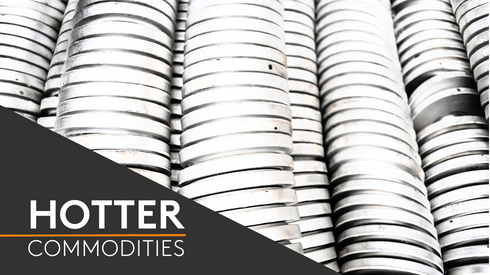Commercial Metals Co (CMC) is focusing on sustainability and growth after kicking off 2022 with a record quarter and a confident fiscal outlook, the company’s top executive said on Monday January 10.
“Before we can responsibly talk about growth, we need to be certain that what we are growing is sustainable,” chairperson, president and chief executive officer Barbara Smith said in a fiscal first-quarter earnings call on Monday, noting that she believes CMC’s best days are yet to come.
Sustainability
While CMC already runs “possibly the cleanest portfolio of steel mills in the world,” they are focused on further environmental progress, Smith said.
The company’s emissions have improved by 6.20% since 2019 and are already under the 2040 Paris Accord target, placing them “in stark contrast to the global industry, which increased its emissions intensity over the same time frame,” according to Smith.
Globally, the steel industry’s energy efficiency has worsened by nearly 6% since 2019, while CMC’s has improved by 7.80% in that same time. The company has also increased the proportion of green energy sources it consumes by approximately 3% and aims to bring this number higher, she added.
Growth
The upcoming Arizona micro-mill that broke ground in September remains on track to utilize on-site solar power for some of the cleanest steelmaking technology available, Smith said.
More than half of the cost of the new plant will be funded by the sale of CMC’s “higher cost and inefficient rebar capacity” in Rancho Cucamonga, California, she added.
CMC plans to invest $475-525 million in the fiscal year 2022, with roughly half of that going to the Arizona mill, senior vice president and chief financial officer Paul Lawrence said.
While CMC expects the Arizona mill to expand their merchant bar footprint to the West Coast, a planned fourth micro-mill announced on Monday will “augment [their] operational footprint in the Eastern United States and enhance [their] ability to serve markets in the Northeast, Mid-Atlantic and Midwest,” according to Smith.
CMC expects a roughly 18-24 month period from when significant construction activity on the new micro mill begins and when it comes online, Smith said, adding that the startup will likely come in late 2024 or early 2025.
Any information the company may provide regarding the size and expense of the new mill will come after a site has been selected, Smith said during the question-and-answer session.
In addition to the micro-mill expansions, Smith added, CMC’s recent agreement to acquire Tensar Corporation “will make CMC a unique provider of value-added reinforcement solutions for the domestic and international construction markets” and “represents CMC’s entry into an adjacent and complementary product space.”
CMC expects the Tensar deal to close in the fiscal third quarter of the year, she said.
On a final growth note, Smith added that she is confident about the future of the company’s core geographical markets.
“For more than a decade, population growth within CMC’s key US markets has outpaced the broader United States,” Smith said. “This trend has picked up pace considerably since early 2020 […] and population drives construction over the long-term.”
Earnings
CMC enjoyed considerably higher earnings despite fewer overall shipments year on year due to increased selling prices; however, the pricing benefits were slightly offset by the high costs of energy, freight and alloys, Lawrence said.
In the three months ended November 30, CMC shipped 334,000 tons of raw material, 442,000 tons of rebar, 257,000 tons of merchant and other steel products, and 400,000 of downstream items.
In the same quarter the previous year, they shipped 330,000 tons of raw material, 486,000 tons of rebar, 264,000 tons of merchant and other steel products, and 371,000 tons of downstream items.
Average selling prices for the quarter were $1,034 per ton for raw materials, up by 64.13% from $630 per ton the previous year; $976 per ton for steel products, up by 59.48% from $612 per ton year on year; and $400 per ton for downstream products, up by 7.82% from $371 per ton in the first quarter of fiscal year 2021.
The margin of steel products over scrap also increased by $202 per ton year on year and $82 per ton from the previous quarter, according to Lawrence.
“During our fourth-quarter earnings call, I indicated that CMC’s downstream backlog was expected to reprice higher throughout fiscal 2022 as new higher price work replaces older lower priced work,” Lawrence said. “We continue to expect further upward movement in CMC’s average backlog price through the remainder of the fiscal year, particularly in light of strong market demand and bid volume.
” Fastmarkets’ price assessment for steel reinforcing bar (rebar), fob mill US averaged $49.57 per hundredweight ($991.40 per short ton) during the September-November period, up by 3.38% from a $47.95 average in the previous quarter.





